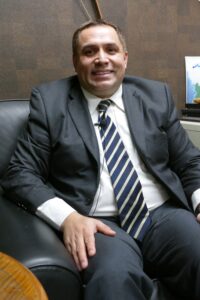One Community Initiative Part 2: Ernest Radillo discusses local DREAMers
Editor’s note: This is the second in a series of columns about immigrants in our midst and how they and the rest of our community are responding to the possibility of significant changes in our immigration laws. The One Community Initiative is an effort by local individuals to foster respect and kindness toward everyone in our community.
My journey to better understand what life here is like for immigrants in North Central Washington led me to a discussion with local immigration attorney Ernest Radillo, who gave me some perspective about the Deferred Action for Childhood Arrivals program. I learned about some of the talented young people who were brought to this country without authorization but who have signed up for DACA and are making important contributions to our community.
In the wee hours of the morning after the election, Radillo received 18 phone calls from parents, teachers, employers and DACA recipients wondering what to do. This is a testament to the anxiety that exists. Inflammatory language by the president-elect and the uncertainty of what might happen was directly responsible.
DACA recipients are in a unique situation that should provoke empathy and understanding. To qualify for DACA, they must have been brought here before the age of 16, attended school, and stayed out of legal trouble. These youngsters have little tie to the country where they were born. Radillo’s view is that these are quality individuals who have good paying jobs, responsible positions and are contributing members of the community. Surely these can’t be seen as criminals, but Trump could expand the definition of what is criminal.
Radillo’s parents, who emigrated from Mexico, were strong believers in the value of education and their children made learning a priority. Radillo, who started practicing law in 2007 in our valley, got a law degree from Seattle University. His twin brother is an electrical engineer and their sister is scientist. Radillo’s practice focuses on immigration and some civil litigation.
Radillo describes the DACA recipients he works with as “amazing people” who are full of drive, ambition and talent. Prior to the executive order that President Obama signed in 2012, those who were working in this country were relegated to low-wage jobs where employers didn’t check credentials thoroughly, Radillo said.
Under DACA, they received permits to work that allowed them to seek jobs suited to their talents. Today, he told me, they work in places like Wells Fargo, Costco, Wenatchee Valley College, as well as packing sheds and numerous other businesses. “They were able to become productive citizens quickly just by having the means to work,” Radillo said.
One person he has helped is a teller at a local bank. “She’s probably on of their best employees, is bilingual and has a great personality,” Radillo said. She’s a single mother with two children. If DACA is eliminated and she loses her ability to work legally, not only would her employer have to let her go and lose a valuable asset, she’d have to pull her children out of day care. Her kids are citizens, so if she’s deported at some point, what would happens to them.
“Does this mean she’s going to have to go work in the shadows again and work in a place where she doesn’t really want to work, making a lot less (money), to survive and provide for her kids,” Radillo asks.
These are the kinds of complications that are so frequently part of the whole immigration dilemma. The young woman has no ties to the country where she was born and didn’t come to the country of her own volition. Should we cast her and others like her aside indiscriminately?
Another DACA recipient that stands out for Radillo is a young woman who is studying engineering at the University of Washington. The woman, who’s from Royal City, is one of the best engineering students in the program.
If the DACA program ends, there will be an economic impact for all of those contributing members of society who can no longer legally work. “They contribute to the well-being of this valley,” Radillo said. The human cost of our broken immigration system is something that must be factored into any changes. Losing DACA recipients as contributing members of our community is unacceptable, in my view.
Coming up next: A conversation with Jorge and Alma Chacon, influential members of our Latino community who are working to unify the community.

